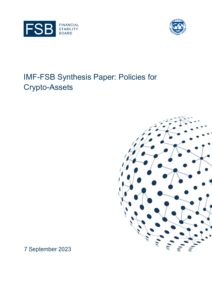Press enquiries:
+41 61 280 8486
[email protected]
Ref: 26/2023
-
Joint paper synthesises risks and policy findings from IMF work on macroeconomic and monetary issues and FSB work on financial stability risks related to crypto-assets.
-
Collective recommendations provide comprehensive guidance to help authorities address the macroeconomic and financial stability risks posed by crypto-asset activities and markets.
-
Report finds that comprehensive regulatory and supervisory oversight of crypto-assets should be a baseline to address macroeconomic and financial stability risks.
-
Report sets out a roadmap to ensure effective, flexible and coordinated implementation of the comprehensive policy response for crypto-assets.
The Financial Stability Board (FSB) and International Monetary Fund (IMF) today published a report outlining a comprehensive policy and regulatory response to crypto-asset activities.
The report synthesises the IMF’s and FSB’s policy recommendations and standards. It illustrates macroeconomic and financial stability implications of crypto-asset activities, how they may interact, and how the IMF and FSB’s policy recommendations fit together. The report also encourages implementation of the Financial Action Task Force (FATF) anti-money laundering and counter-terrorist financing (AML/CFT) standards to address risks to financial integrity and mitigate criminal and terrorist misuse of the crypto-assets sector.
The report finds that a comprehensive policy and regulatory response for crypto-assets is necessary to address the risks of crypto-assets to macroeconomic and financial stability. To address macroeconomic risks, jurisdictions should safeguard monetary sovereignty and strengthen monetary policy frameworks, guard against excessive capital flow volatility and adopt unambiguous tax treatment of crypto-assets. Comprehensive regulatory and supervisory oversight of crypto-assets can help to address financial stability and financial integrity risks while supporting macroeconomic policies. Comprehensive regulatory and supervisory oversight of crypto-assets should be a baseline to address macroeconomic and financial stability risks.
Some jurisdictions, in particular emerging markets and developing economies, may want to take additional targeted measures that go beyond the global regulatory baseline to address specific risks.
The report sets out a roadmap, developed together with relevant international organisations and standard-setting bodies, to ensure the effective implementation of the FSB’s and IMF’s recommendations and standards. The roadmap includes currently planned and ongoing work to build institutional capacity beyond G20 jurisdictions; enhance global coordination, cooperation, and information sharing; and address data gaps necessary to understand the rapidly changing crypto-asset ecosystem.
Notes to editors
The FSB, with its core mandate to coordinate the development of regulatory, supervisory, and other financial sector policies, was tasked by the G20 to promote cooperation among jurisdictional financial authorities and SSBs to ensure that crypto-asset activities are subject to robust regulation and supervision commensurate to the financial stability risks that they pose, while supporting responsible innovation.
In July 2023, the FSB published a Global Regulatory Framework for Crypto-asset Activities, which consisted of two distinct recommendations for the regulation, supervision and oversight of crypto-asset markets and activities and “global stablecoin arrangements”.
In February 2023, the IMF published a note to the G20 on the Macrofinancial Implications of Crypto Assets, building on recommendations outlined in the Elements of Effective Policies for Crypto Assets. This synthesis paper, which consolidates the key recommendations proposed by the FSB and IMF, was produced at the request of the Indian G20 Presidency.
The FSB coordinates at the international level the work of national financial authorities and international standard-setting bodies and develops and promotes the implementation of effective regulatory, supervisory, and other financial sector policies in the interest of financial stability. It brings together national authorities responsible for financial stability in 24 countries and jurisdictions, international financial institutions, sector-specific international groupings of regulators and supervisors, and committees of central bank experts. The FSB also conducts outreach with approximately 70 other jurisdictions through its six Regional Consultative Groups.
The FSB is chaired by Klaas Knot, President of De Nederlandsche Bank. The FSB Secretariat is located in Basel, Switzerland and hosted by the Bank for International Settlements.
